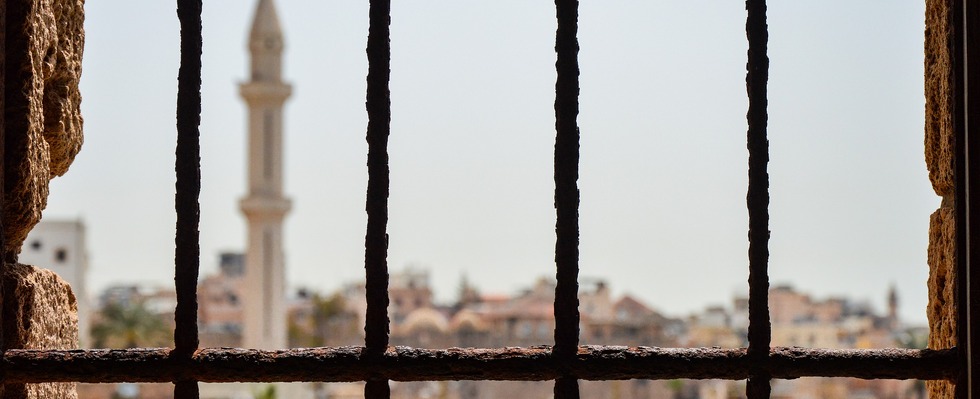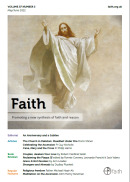Religious freedom
Fr Michael Nazir-Ali looks at the plight of persecuted Christians today – and our response.
The world has always had plenty of tyrants. People have had to suffer under tyrannies down the centuries. The early Church, too, suffered under the tyranny both of pagan Rome and of Persia.
And tyranny has not ceased. In modern times, we have had tyranny of power and wealth – and also of ideologies. The 20 th century brought the terrible suffering wrought by Nazism and Communism. Today we have new examples of tyranny, notably Chinese Marxism – linked to nationalism – and Hindutua – linked to political Hindu revivalism in India. Much suffering has been caused to Christians, Yazidis, Baha’is and even Muslims by extreme Islamism. Viewing the latter at first hand, along with Aid to the Church in Need (ACN), I was able to see how ISIS destroyed the settled lives of Christians, Yazidis and ordinary Muslims in a country like Iraq. It is wonderful that Iraqi Christians, like Pascale Warda, are now helping those of all communities to rebuild their lives, with the help of agencies like ACN and the Oxford Centre for Training, Research, Advocacy and Dialogue (OXTRAD).
We must be on our guard against tyranny – including the “little tyrants”, the bureaucrats, soldiers and police who enforce the rules of tyrants or sometimes act on their own, for personal financial enrichment or for personal power. These are the people who act at a local level, making the lives of Christian difficult by emphasising the things that set them apart. This can happen, for example, to Christians in a territory where a majority of people are of another faith tradition. It takes courage – daily courage – to live the Christian life under such circumstances. And the local “little tyrants” can work with the jealousies and tensions in the community, stirring up ill-feeling and even violence. In Turkey, for instance, action against Christians can be taken at these local and lower levels, enabling those ‘higher up’ to deny any involvement.
In history
The plight of Christians under a tyrannical regime – finding themselves regarded as an “enemy within” in the land of their birth, their homeland, where they belong – is tragic. Even family members can turn against Christians when they discover their decision for Christ. We can see that this happened in history, for example, with the Vietnamese martyrs of the 19 th century. Today, it can happen in countries such as Iran. Often the informers come from within families, not because they want to be informers, but because they are compelled, forced, or simply put under extreme social or economic pressure.
As an international charity, Aid to the Church in Need is able to publish and spread information about the plight of persecuted Christians in various parts of the world. Its recent report “Hear Her Cries” details the specific horror of Christian girls and young women abducted and kidnapped into forced-marriages in countries from Egypt to Pakistan. This report brings to the world the plight of the victims, and urges that these crimes are recognised as such by the countries concerned and also by the international community. Girls who have managed to escape describe what happened. They and their families also need practical support and help, which can be provided through the Church.
Informed
It is important to be informed: Aid to the Church in Need through its presence and work is able to report in detail about situations which might otherwise seem remote or remain neglected. And we should not be tempted to put uncomfortable information aside. As part of the Church, we need to be informed and to recognise realities.
The Church honours martyrs. Some have died for justice – for example, Oscar Romero. Others have died for the faith and as an act of love – for example, Maximilian Kolbe. The Pakistani Federal Minister Shahbaz Bhatti’s case for canonisation is now open. He died to protect fundamental freedoms for religious minorities. Such martyrs are not just witnesses for the Church but for the world, standing for justice, freedom and love. They are an inspiration to all, Christian and non-Christian, showing us the truth about human dignity and freedom. They can inspire us to recognise that we too should be witnesses to truth (that is really what the term ‘martyr’ means). And, yes, such witnessing can also lead to suffering and even to death.
Tempting
It really is tempting to put thoughts of martyrdom aside – it is, after all, rather uncomfortable being made to think about the idea of suffering for Christ, and having our faith challenged at a deep level. It is so much nicer just to go along with the flow of things, where our prayers and our attendance at church are part of a routine, which is, after all, not particularly inconvenient and which often makes us feel quite good about life. But Jesus calls his followers to take up their crosses and to follow Him and we must understand that martyrdom is part of the history of the Church – part of the reality of what has happened down the centuries and into our own time. Those who are suffering today for their Christian beliefs are part of the Church across the world and down the ages and in a sense of history too. We cannot just think about aspects of Christian life that make us feel comfortable – we must accept that part of our whole approach to the Faith is an acceptance of the heroism of martyrdom and the challenge that it presents to us.
A Christian martyr is above all a person who prays, who recognises him or herself before God and witnesses to the world. And the Church unites all in prayer – so we can join our prayers with the prayers of those who have gone before and those who are suffering and experiencing injustice, imprisonment, discrimination and oppression today, that the Lord of the Church will strengthen those who suffer in his name and deliver them from their torment. We pray also for ourselves that our courage will not fail us when the time comes to witness fearlessly to the truth of the Gospel and its demand on us and in the world.
Let us pray for ACN and for all those who work with the persecuted church that God will strengthen the hands of all those who work for justice love and freedom and will provide them with the means to relieve the suffering of our brothers and sisters.






